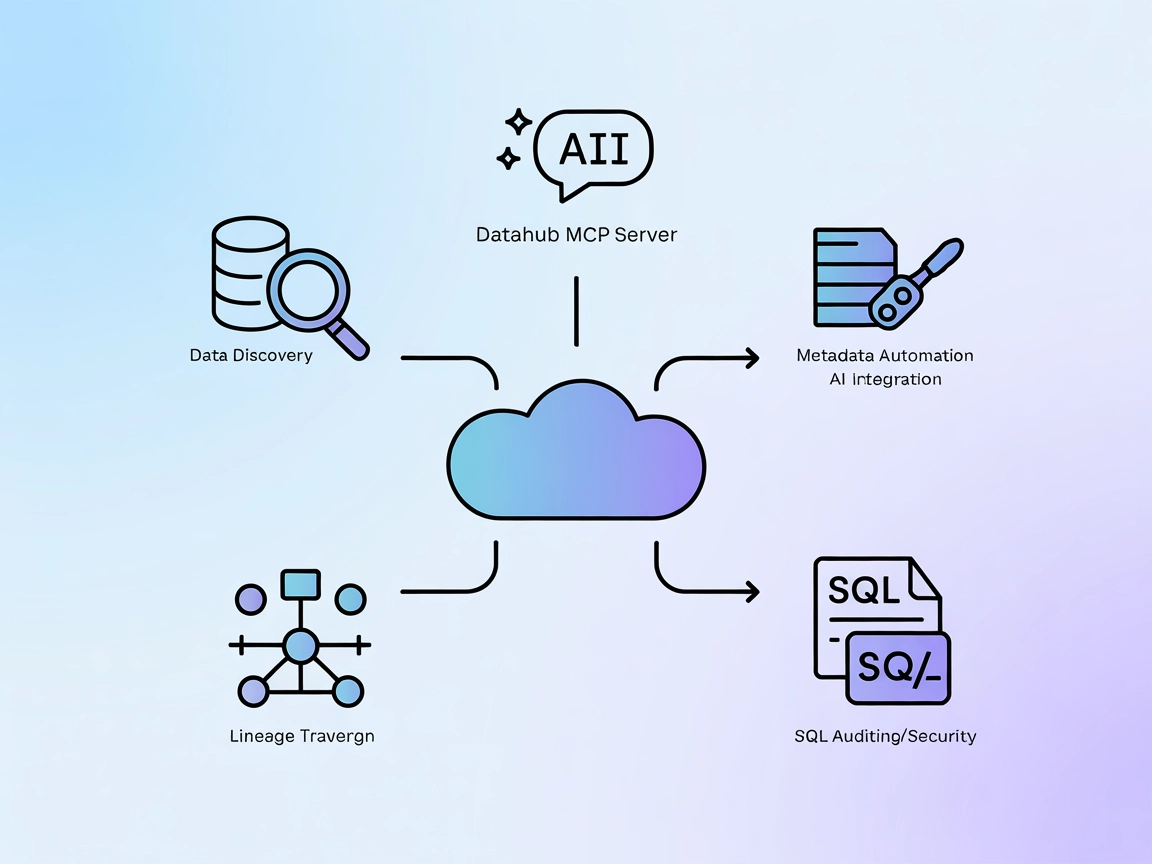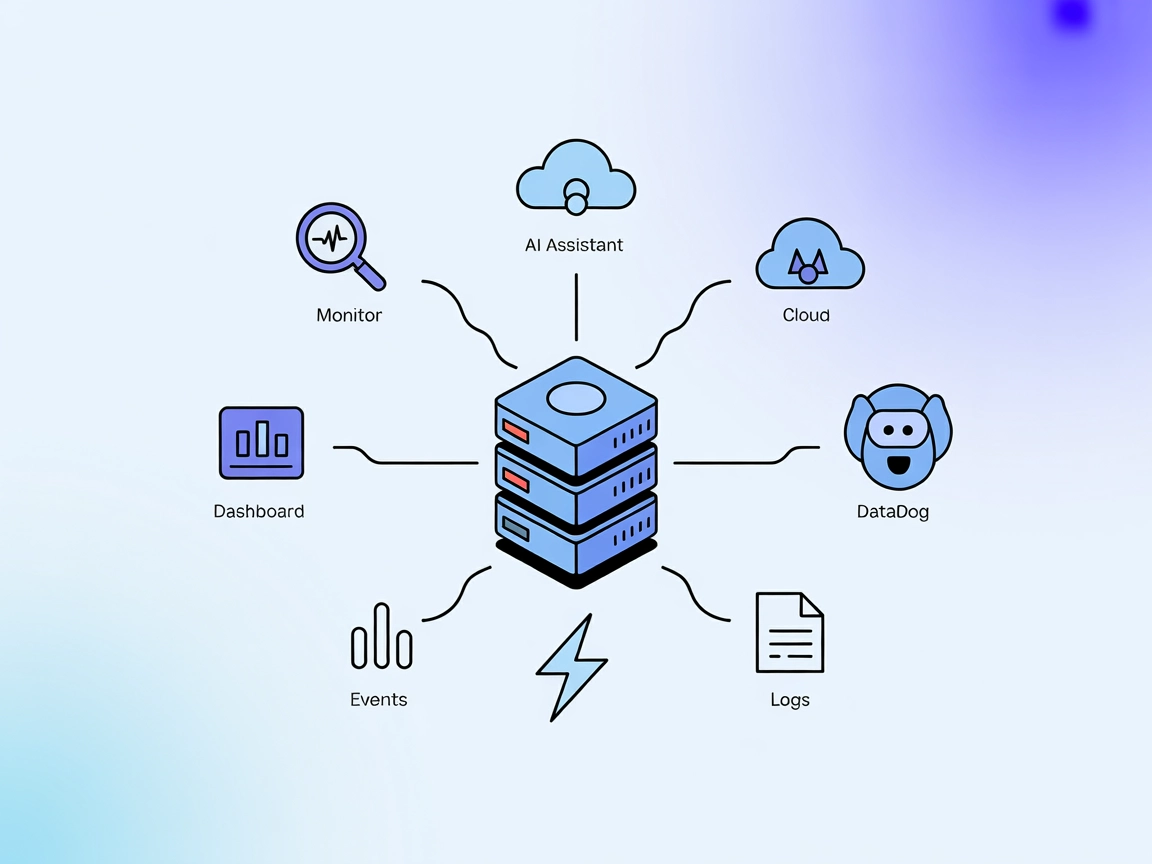
DataHub MCP Server Integration
The DataHub MCP Server bridges FlowHunt AI agents with the DataHub metadata platform, enabling advanced data discovery, lineage analysis, automated metadata ret...

Connect FlowHunt to Datadog for AI-powered monitoring, metrics, logs, and incident management through the Datadog MCP Server.
FlowHunt provides an additional security layer between your internal systems and AI tools, giving you granular control over which tools are accessible from your MCP servers. MCP servers hosted in our infrastructure can be seamlessly integrated with FlowHunt's chatbot as well as popular AI platforms like ChatGPT, Claude, and various AI editors.
The Datadog MCP Server is a Model Context Protocol (MCP) server designed to bridge AI assistants and the official Datadog API. By acting as an intermediary, it enables AI-based tools and agents to access, query, and manage monitoring data, dashboards, metrics, events, logs, and incidents from Datadog accounts. This integration empowers developers and operators to automate monitoring tasks, perform advanced queries, and interact with Datadog resources directly from their AI workflows or assistants. The server supports both Datadog v1 and v2 APIs, providing comprehensive access to service endpoints, enhanced error handling, and the ability to specify regional or service-specific endpoints for logs and metrics. Ultimately, it streamlines workflows related to observability and incident management by making Datadog’s capabilities accessible within broader AI-driven automation and development environments.
No explicit prompt templates are mentioned in the available documentation or code.
No explicit list of tools (as MCP tools) is available in the documentation or server source tree as presented. The functionalities (monitoring, dashboards, etc.) are likely implemented as tools, but are not enumerated as discrete MCP tools in the documentation.
No explicit Windsurf setup instructions are given in the documentation.
npx.claude_desktop_config.json configuration file.mcpServers object:{
"mcpServers": {
"datadog": {
"command": "npx",
"args": [
"datadog-mcp-server",
"--apiKey",
"<YOUR_API_KEY>",
"--appKey",
"<YOUR_APP_KEY>",
"--site",
"<YOUR_DD_SITE>(e.g us5.datadoghq.com)"
]
}
}
}
Advanced configuration with service-specific endpoints:
{
"mcpServers": {
"datadog": {
"command": "npx",
"args": [
"datadog-mcp-server",
"--apiKey", "<YOUR_API_KEY>",
"--appKey", "<YOUR_APP_KEY>",
"--site", "<YOUR_DD_SITE>",
"--logsSite", "<YOUR_LOGS_SITE>",
"--metricsSite", "<YOUR_METRICS_SITE>"
]
}
}
}
Securing API Keys using environment variables:
{
"mcpServers": {
"datadog": {
"command": "npx",
"args": [
"datadog-mcp-server"
],
"env": {
"DD_API_KEY": "<YOUR_API_KEY>",
"DD_APP_KEY": "<YOUR_APP_KEY>"
}
}
}
}
No explicit Cursor setup instructions are given in the documentation.
No explicit Cline setup instructions are given in the documentation.
Using MCP in FlowHunt
To integrate MCP servers into your FlowHunt workflow, start by adding the MCP component to your flow and connecting it to your AI agent:

Click on the MCP component to open the configuration panel. In the system MCP configuration section, insert your MCP server details using this JSON format:
{
"datadog": {
"transport": "streamable_http",
"url": "https://yourmcpserver.example/pathtothemcp/url"
}
}
Once configured, the AI agent can use this MCP as a tool with access to all its functions and capabilities. Remember to change “datadog” to the actual name of your MCP server and replace the URL with your own MCP server URL.
| Section | Availability | Details/Notes |
|---|---|---|
| Overview | ✅ | |
| List of Prompts | ⛔ | No prompt templates listed |
| List of Resources | ✅ | Monitoring, Dashboards, Metrics, Events, Logs |
| List of Tools | ⛔ | Not explicitly enumerated as MCP tools |
| Securing API Keys | ✅ | Env vars and JSON config examples provided |
| Sampling Support (less important in evaluation) | ⛔ | Not mentioned |
Roots support: ⛔ (Not mentioned)
Based on the completeness of the documentation, presence of setup instructions for Claude, and resource listing, but lack of prompt templates, MCP-tool enumeration, and Roots/Sampling support, we would rate this MCP server as moderately mature and ready for practical integration in AI workflows.
| Has a LICENSE | ✅ (MIT) |
|---|---|
| Has at least one tool | ⛔ |
| Number of Forks | 5 |
| Number of Stars | 45 |
The Datadog MCP Server is a Model Context Protocol server that connects AI agents and workflows to Datadog’s API, enabling automated access to monitoring data, dashboards, metrics, logs, and incident resources.
You can access monitors, dashboards, metrics (and their metadata), events, and logs from your Datadog account, enabling comprehensive observability and incident management within AI-driven workflows.
You can secure your API and Application keys by using environment variables in your MCP server configuration, as shown in the setup examples.
No explicit prompt templates or tool enumerations are provided in the current documentation. The main functionalities are accessed via API resource endpoints.
Primary use cases include monitoring automation, dashboard exploration, metric analysis, incident and event management, and advanced log search/filtering via AI agents.
Unlock seamless AI-driven observability by connecting Datadog to your FlowHunt workflows. Automate monitoring, query metrics, and manage incidents directly from your AI agents.

The DataHub MCP Server bridges FlowHunt AI agents with the DataHub metadata platform, enabling advanced data discovery, lineage analysis, automated metadata ret...

The Model Context Protocol (MCP) Server bridges AI assistants with external data sources, APIs, and services, enabling streamlined integration of complex workfl...

The ModelContextProtocol (MCP) Server acts as a bridge between AI agents and external data sources, APIs, and services, enabling FlowHunt users to build context...
Cookie Consent
We use cookies to enhance your browsing experience and analyze our traffic. See our privacy policy.